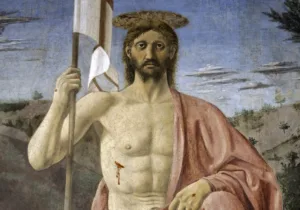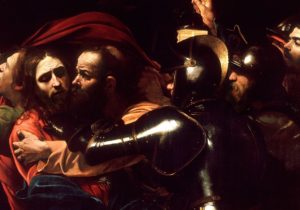The events of Holy Tuesday follow directly from Monday’s temple clearing, during which, among much else, Jesus manifest his messianic claims. Questioning his right to do such things, the Pharisees strove to discredit his authority. Holy Tuesday depicts the multiple conspiracies to entangle Jesus, efforts to find him in contempt of legal, theological, or scriptural norms. Jesus dealt deftly with each. On the question of to whom allegiance is owed—Caesar or God—Jesus reminded his challengers that spheres of authority, both political and spiritual, had long been established by God thereby giving the people of God duo obligations, concrete responsibilities in each sphere. On other questions touching doctrinal issues, Jesus turned the tables to reveal his challengers’ own lack of theological understanding and their basic ignorance of scripture. At every turn, Jesus established that it was these Pharisees, and not himself, who were the baddies, peddling a false faith focused on individual piety and privilege to the neglect of loving God and neighbor.
I have written elsewhere of the idea of sonship in scripture. T,L,D,R: sonship in the Hebraic mind suggests that someone possesses the characteristics of the thing signified. When in the Sermon on the Mount peacemakers are called the “sons of God,” the idea is that peacemakers manifest the character of the Divine. With this in mind, and in view of the aggression of Jesus’ detractors on this day, Holy Tuesday can be understood as the beginning of the final demarcation of sides, separating those who in their love of God could genuinely be called His people, and those who in their intractable devotion to self-love could, finally, only be understood as His enemies.
That anyone would choose enmity against him was a source of grief to the Messiah, as clearly evidenced by his lamentation over the capital city:
O Jerusalem, Jerusalem, the city that kills the prophets and stones those who are sent to it! How often would I have gathered your children together as a hen gathers her brood under her wings, and you were not willing!
Christ understood that the people’s lack of faith would render them subject for a judgment they were neither prepared to endure nor capable of imagining. He prophesied to his disciples that his own clearing of the temple would prove to be nothing compared to what the Romans would do a short time hence. On that grim day—it would be in the year 70 AD—the Romans would besiege the city of Jerusalem. It would be a catastrophe for the people of God. When the city finally fell, the historians tell us that the triumphant Romans rushed through streets in which the Jewish dead were stacked like cordwood. The looting, and raping, and killing were devastating. If the Jewish historian Josephus’ tally is accurate, more than 1.1 million people, mostly Jews, were killed. Bitterly, a part of the reason so many were killed is that destruction took place over Passover when, once again, and despite ongoing war between the Romans and the Jews, pilgrims from the Jewish diaspora nevertheless journeyed to Jerusalem to visit the temple and were trapped by the siege. When the city was subdued, armed rebels and frail citizens alike were put to death. Nearly 100,000 were enslaved. The temple would be taken down stone by stone and the entirety of the Temple Mount set ablaze. In the aftermath, of the city itself, Josephus writes:
And truly, the very view itself was a melancholy thing; for those places which were adorned with trees and pleasant gardens, were now become desolate country every way, and its trees were all cut down. Nor could any foreigner that had formerly seen Judaea and the most beautiful suburbs of the city, and now saw it as a desert, but lament and mourn sadly at so great a change. For the war had laid all signs of beauty quite waste. Nor had anyone who had known the place before, had come on a sudden to it now, would he have known it again. But though he [a foreigner] were at the city itself, yet would he have inquired for it.
And thus began a second period of exile. For the next 1900 years, no Jewish authority would hold sway over the land given to Abraham. Of the catastrophe, a traditional Jewish prayer recognizes—consistent with biblical precedence—that the punishment of Rome was but a proxy for Divine judgment: “Because of our sins we were exiled from our country and banished from our land.”
Following this dire prophecy, Jesus and his disciples retreated to the Mount of Olives, where he instructed them through a number of parables, each illustrating the need for his disciples to be prepared for what was facing them, both in the immediate days to come and in the longer—if truncated—reach of their own lives. Despite the horrors that were to befall them, Jesus implores them to endure, anchoring their hope in the prospects of his own future return. After these parabolic exhortations, and lest they not fully apprehend the criticality of what he is saying, Jesus finally makes plain to them his own impending death: “You know that after two days the Passover is coming, and the Son of Man is to be delivered up for crucifixion.” In the shadow of this terrible news, his purposes this day are revealed: preparation, endurance, and hope are three of the great themes of Holy Tuesday.
These have been enduring themes throughout Jewish history. One might think of the prophet Jeremiah. More than 500 years before the destruction of the second temple of Jesus’ day, the first was about to fall. Jeremiah was in besieged Jerusalem, only this time it was Nebuchadnezzar and his Babylonian army surrounding the city. They had overrun the countryside and would soon overrun the city. Jerusalem would burn, its walls and temple brought down. The Jews would be scattered. Jeremiah knew all this. The Lord had spoken the judgment clearly. And so, with the din of the invading hordes growing closer just beyond the city walls, what did Jeremiah do? Well, in obedience to a Divine command he bought land in Anathoth, a stone’s throw from Jerusalem and already in Chaldean hands. Entirely sober, Jeremiah agreed to the terms of the purchase, signed the deed, put his seal on the contract, paid his shekels, and sealed the deed in a clay jar. Yes, God had promised Jeremiah that the Jews would someday return to the land. No, God did not promise Jeremiah he would. And he never did.
The imagery surrounding Jeremiah’s purchase reminds me of the revolt of Sonderkommando—or special detail—in Auschwitz-Birkenau. The special detail was a group of Jewish prisoners forced to work in the gas chambers and crematoria. In the fall of 1944, Auschwitz was operating at its greatest capacity as it strove to engulf the final remnants of Hungarian Jews, the last of European Jewry to be given up to the Nazis. In October of that year, the sonderkommando responsible for the Krematoria IV decided to revolt. “Secret bearers,” they knew they would follow the last victims in certain death. And, so, like Jeremiah, they sealed documents in jars and buried them in the earth. In this case, the documents were important descriptions of camp life and records of Nazi atrocities. They then gathered together stolen explosives they had stockpiled and destroyed their crematorium. Over 250 prisoners would be killed, in relatively quick fashion, in the brief revolt that followed. Another 200 were killed in reprisal. Krematoria IV would never operate again. Not incidentally, a transport of Jews who were at that moment of the uprising being crammed into the gas chamber of Krematoria III were removed from the chamber and put on lockdown. At least some of those Jews survived. Some time after the war’s end, the buried jar was uncovered. Some time shortly after that, a Jewish nation again returned to promised land.
Salient in both cases is the quality of hope on display. Hope is a compound, made up of both expectation and desire. To expect something to happen but to have no desire for it is not, of course, hope—it is something more like dread. On the other hand, to desire something but to have no real expectation that you will ever possess it is also not hope, but either despair or wishful thinking. Nor is it a matter of hope to strive for something easily gotten. Hope, according to Thomas Aquinas, is born from the desire for something good that is “difficult but possible to attain.” Thomas further observed that the prospects for hope on these narrow terms are amplified when we do not strive alone. Sometimes, friends make attainment of our aspirations possible in ways we that might not have been possible if we were on our own. Everything depends on the power of the thing in which we set our hope to deliver. For Jeremiah, his hope was rooted in a God who keeps His promises. Because the Lord had promised Abraham land and a people, Jeremiah knew—whatever the seemingly contrary testimony of the events around him—that there would indeed be a land and a people to inhabit it—however far off in the future. Hope, in this sense, is very nearly synonymous with faith.
C.S. Lewis touches on something like this in Christian Reflections. There, Lewis is discussing how it is possible to continue believing things when reasonable testimony seems to render such things patently impossible. About the role of faith in this Lewis writes:
When we exhort people to Faith as a virtue, to the settled intention of continuing to believe certain things, we are not exhorting them to fight against reason. The intention of continuing to believe is required because, though Reason is divine, human reasoners are not. When once passion takes part in the game, the human reason, unassisted by Grace, has about as much chance of retaining its hold on truths already gained as a snowflake has of retaining its consistency in the mouth of a blast furnace. The sort of arguments against Christianity which our reason can be persuaded to accept at the moment of yielding to temptation are often preposterous. Reason may win truths; without Faith she will retain them just so long as Satan pleases. There is nothing we cannot be made to believe or disbelieve. If we wish to be rational, not now and then, but constantly, we must pray for the gift of Faith, for the power to go on believing not in the teeth of reason but in the teeth of lust and terror and jealousy and boredom and indifference that which reason, authority, or experience, or all three, have once delivered to us for truth.
Christian realism is rooted in precisely this kind of hope, this kind of faithfulness. We know, for instance, that we will not eradicate evil in our time. To believe that we can make a paradise on earth on our own is, on Lewis’ terms, to believe something that neither reason, nor authority, nor the experience of history can give us any reason to believe. But, on the witness of those same terms, we can reasonably believe we can eradicate some evils and at least diminish others. And so there is work to be done. There’s a story that goes around that Martin Luther was once asked what he would do if he were absolutely certain the world was going to end tomorrow. Supposedly he said, “Probably plant a tree.” That strikes me as being just about right.
I do not know what confidence the disciples had, nor what comfort they could rely on as they sat on the Mount of Olives listening to their teacher proclaim his own coming slaughter. It does not seem any of them had yet seen enough to rest in the hope of a future day when all things would be made right. That steel would not be in their spines until Easter morning. Jesus for his part, it’s important to remember, would rest everything on his own hope. As we will see, the agony he experienced in the garden was very real. It would take everything he had faith in to see himself through. The writer of Hebrews tells us that it was this hope alone that readied him to endure the cross. As we will see, the content of this hope is extraordinary.
In light of all this, how might the Christian live despite the horrors that seem, always, to array around us and, seemingly, are increasing by the day? Well, one way is probably to not get too dramatic and overstate the case. The world has always been a perilous place. To turn again to Lewis, he was once asked how Christians ought to live in an age in which atomic weaponry, newly arrived in the human story, could snuff out life in an instant. His answer, shockingly apropos to the present times, would be glib were it not true:
Why, as you would have lived in the sixteenth century when the plague visited London almost every year, or as you would have lived in a Viking age when raiders from Scandinavia might land and cut your throat any night; or indeed, as you are already living in an age of cancer, an age of syphilis, an age of paralysis, an age of air raids, an age of railway accidents, an age of motor accidents.” In other words, do not let us begin by exaggerating the novelty of our situation. Believe me, dear sir or madam, you and all whom you love were already sentenced to death before the atomic bomb was invented: and quite a high percentage of us were going to die in unpleasant ways. We had, indeed, one very great advantage over our ancestors—anesthetics; but we have that still. It is perfectly ridiculous to go about whimpering and drawing long faces because the scientists have added one more chance of painful and premature death to a world which already bristled with such chances and in which death itself was not a chance at all, but a certainty. This is the first point to be made: and the first action to be taken is to pull ourselves together. If we are all going to be destroyed by an atomic bomb, let that bomb when it comes find us doing sensible and human things—praying, working, teaching, reading, listening to music, bathing the children, playing tennis, chatting to our friends over a pint and a game of darts—not huddled together like frightened sheep and thinking about bombs. They may break our bodies (a microbe can do that) but they need not dominate our minds.







 Sponsor a student for Christianity & National Security 2024
Sponsor a student for Christianity & National Security 2024